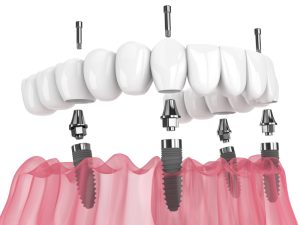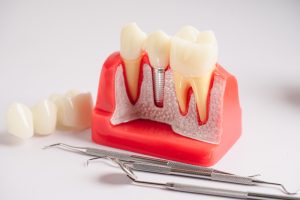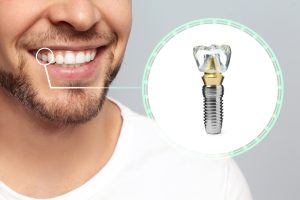A Lasting, Fully Functional Smile 
Are you tired of hiding your smile or struggling with missing teeth? Imagine biting into your favorite foods, speaking with confidence, and flashing a radiant smile without a second thought. At Polasek Digital Dentistry & Schaefer Dental Group in Howell, MI, we’re turning these dreams into reality with our revolutionary dental implant solutions. Led by Howell, MI, implant dentist, Dr. Kyle Polasek, our practice is at the forefront of implant dentistry, offering hope and transformation to patients suffering from tooth loss.
Whether you’re missing a single tooth or need full-arch restoration, our cutting-edge dental implant technology and compassionate approach can help you reclaim your smile and your confidence. Experience the transformative power of dental implants. Contact our Livingston County dental practice at 517-546-8983 to schedule a consultation with Dr. Polasek and take the first step towards a renewed smile.
What Are Dental Implants?
Dental implants are revolutionary tooth replacement solutions that have transformed the field of restorative dentistry. These small, biocompatible metal posts are surgically placed into the jawbone, serving as artificial tooth roots. At Polasek Digital Dentistry & Schaefer Dental Group in Howell, MI, Dr. Polasek uses state-of-the-art technology to provide patients with dental implants that look, feel, and function just like natural teeth.
The magic of dental implants lies in their ability to fuse with your jawbone through a process called osseointegration. This integration with the jawbone creates a sturdy foundation for custom-made prosthetic teeth, ensuring a seamless blend with your natural smile. Whether you’re missing one tooth or several, dental implants offer a long-lasting solution that can significantly improve your oral health and quality of life.
The Dental Implant Structure
Understanding the components of a dental implant can help you appreciate the intricacy of this dental marvel. Here’s the breakdown of a dental implant, piece by piece:
- Implant Body: This is the cornerstone of the dental implant system. Typically made from titanium or a titanium alloy, it’s surgically inserted into your jawbone to act as an artificial tooth root.
- Abutment: Think of this as the bridge between the dental implant body and your new tooth. It’s the connecting piece that protrudes slightly above the gum line.
- Artificial Tooth: This is the visible part of your implant – usually a custom-made crown designed to match your natural teeth perfectly.
Benefits of Dental Implants
Dental implants offer a wide range of benefits for patients seeking tooth replacement solutions. Here’s a more detailed look at the advantages of choosing dental implants:
Aesthetic and Functional Benefits
- Natural Appearance: Dental implants look and function just like real teeth, providing you with a natural-looking smile that boosts your confidence. They blend seamlessly with your existing teeth, making it difficult for others to distinguish them from your natural teeth.
- Improved Chewing Ability: With dental implants, you can enjoy a wider variety of nutritious foods, contributing to your overall health and well-being. The stability of implants allows for more efficient chewing, similar to natural teeth.
- Enhanced Speech: Dental implants can help improve your speech clarity, especially when compared to removable dentures that may slip or cause lisping.
Long-Term Advantages
- Durability: Dental implants are designed to be long-lasting, often serving as a permanent solution for tooth replacement. With proper care, they can last for decades or even a lifetime.
- Preservation of Jawbone: Implants help prevent bone loss in the jaw, which commonly occurs after tooth loss. This preservation of bone structure maintains facial aesthetics and prevents premature aging.
- Protection of Adjacent Teeth: Unlike traditional bridges, dental implants don’t require altering healthy adjacent teeth for support, thus preserving more of your natural tooth structure.
Health and Lifestyle Benefits
- Improved Oral Health: Dental implants allow for easier access between teeth for brushing and flossing, promoting better overall oral hygiene.
- Convenience: The maintenance routine for dental implants is simple, similar to caring for natural teeth. There’s no need for special cleaners or adhesives required with dentures.
- Quality of Life: Implants can significantly improve your quality of life by restoring full functionality to your mouth, allowing you to eat, speak, and smile with confidence.
Cost-Effectiveness
While the initial cost of dental implants may be higher than other tooth replacement options, they often prove to be a cost-effective long-term solution due to their durability and low maintenance requirements.
Types of Dental Implants
At our Howell practice, Dr. Polasek offers a variety of dental implant options to suit your unique needs:
- Endosteal Dental Implants: These are the most common type placed directly into the jawbone. They’re ideal for patients with sufficient bone density and provide a stable foundation for artificial teeth.
- Single-Tooth Dental Implants: Perfect for replacing individual missing teeth, single-tooth implants consist of a titanium post topped with a custom-made crown. They offer a permanent solution that blends seamlessly with your natural teeth.
- All-On-Four: This innovative technique allows us to replace an entire arch of teeth using just four strategically placed implants. It’s an excellent option for patients with lower bone density and can often be completed in a single day.
- Implant-Supported Bridges: For multiple adjacent missing teeth, implant-supported bridges offer a stable and aesthetically pleasing solution. They use dental implants as anchors, eliminating the need to alter healthy adjacent teeth.
- Implant-Supported Dentures: Say goodbye to loose, uncomfortable dentures. Implant-supported dentures combine the benefits of implants with the full-arch replacement of dentures, providing enhanced stability and comfort.
- Mini Dental Implants: These smaller versions of traditional implants are less invasive and can be a great option for stabilizing loose dentures or replacing small teeth in areas with limited space.
- Immediate-Load “Same Day” Dental Implants: In some cases, Dr. Polasek can place the implant and attach a temporary crown in a single visit, allowing you to leave our Howell office with a functional tooth on the same day.
Dental Implant Procedure
The dental implant procedure at Polasek Digital Dentistry & Schaefer Dental Group in Howell, MI, is a comprehensive process designed to restore your smile with precision and care. Here’s a more detailed look at each step of the procedure:
Initial Consultation and Planning
- Comprehensive Evaluation: Dr. Polasek conducts a comprehensive dental exam of your oral health, including 3D X-rays and digital jaw scans. This evaluation helps determine the condition of your jawbone and whether you’re a suitable candidate for implants.
- Personalized Treatment Plan: Based on the evaluation, a customized treatment plan is created, outlining the steps, timeframe, and expected costs of your implant procedure.
Preparatory Procedures
- Tooth Extraction: If necessary, any damaged or decayed teeth are removed before implant placement.
- Bone Grafting: In cases where the jawbone lacks sufficient density, a bone graft may be performed to create a solid foundation for the implant.
Implant Placement
- Dental Implant Surgery: Using advanced techniques, Dr. Polasek makes a small incision in the gum to expose the jawbone. A specialized drill is then used to create a precise hole for the implant.
- Implant Insertion: The titanium implant post is carefully placed into the prepared site in your jawbone.
- Initial Healing: The gum tissue is sutured closed over the implant, and a healing period begins.
Osseointegration
- Bone Integration: Over the next few months, the implant fuses with your jawbone through a process called osseointegration. This crucial step ensures the implant is securely anchored.
- Monitoring: During this period, your progress is closely monitored to ensure proper healing and integration.
Abutment Placement
- Secondary Procedure: Once osseointegration is complete, a minor surgery is performed to attach the abutment – the connector piece between the implant and the crown.
- Gum Healing: The gum tissue is allowed to heal around the abutment, forming a natural-looking gum line.
Crown Placement
- Custom Fabrication: A crown is custom-made to match the color, shape, and size of your natural teeth.
- Final Attachment: The crown is securely attached to the abutment, completing your smile restoration.
What’s the Best Implant Treatment Option for You?
Determining the ideal implant solution depends on various factors, including the number of missing teeth, your jawbone condition, and your budget. Dr. Polasek will thoroughly evaluate your case and discuss all available options to help you make an informed decision.
We’re committed to providing top-notch implant dentistry to residents of Howell, Pinckney, Wilmington, Fenton, Milford, and surrounding areas in MI. To explore your dental implant options, call us at 517-546-8983 and schedule your consultation today.
Frequently Asked Questions
Absolutely. Replacing a missing tooth is crucial for maintaining oral health and preventing complications such as:
- Misalignment of surrounding teeth
- Jawbone deterioration
- Increased risk of gum disease
- Difficulty with speech and eating
- Potential changes in facial structure
While various dental professionals can place implants, it’s crucial to choose an experienced practitioner. Dr. Kyle Polasek at Polasek Digital Dentistry & Schaefer Dental Group has extensive training and expertise in implant dentistry, ensuring you receive the highest quality dental care ever.
With proper care, dental implants can last a lifetime. Regular dental check-ups and excellent oral hygiene are key to maximizing the longevity of your implants.







